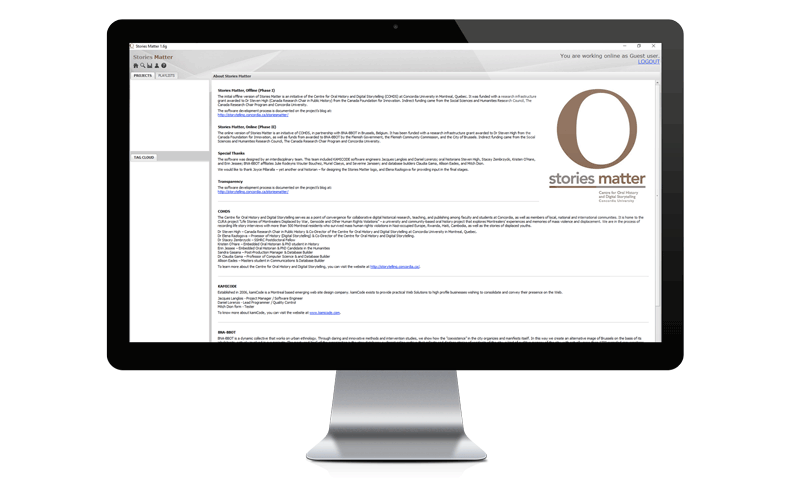Concordia University Stories Matter

Conçu par l'Université Concordia et l'équipe KAMICODE pour le COHDS, Stories Matter est un logiciel gratuit pour Mac et PC. Cet outil est accessible pour les historiens oraux et procure une alternative à la transcription, assurant ainsi que les chercheurs continueront d'interagir entre eux une fois les interviews terminées.
Type de projet:Desktop ApplicationPrincipales caractéristiques
Technologies
Télécharger l'app
Vidéo
Témoignage du client
The Centre for Oral History and Digital Storytelling (COHDS) at Concordia University, of which I am co-director, has worked closely KAMICODE for the past two and a half years on a DRUPAL and ADOBE AIR based database tool for researchers, funded by the Canada Foundation for Innovation and the Canada Research Chairs program.
Stories Matter (http://storytelling.concordia.ca/storiesmatter/) is a free open-source database tool developed by and for oral historians as an alternative to the transcription of interviews. Stories Matter software was completed in two phases. Phase I provides individual oral historians and related practitioners with a local database building tool that allows them to annotate and analyze digital video and audio materials in their collections, while retaining much of the emotive power of the voice that is typically lost in the transcription process.
COHDS-based oral historians worked closely with Mr. Langlois and his team each step of the way. During Phase I, two oral historians were embedded into the software development team to ensure that software was ‘by’ and ‘for’ oral historians. We found that Mr. Langlois and his team were flexible and committed to producing the best possible product. The results of Phase I met our expectations in every way. In fact, we were so happy with the outcome that we signed another contract with KAMICODE for Phase II of Stories Matter.
We have been invited to give presentations and workshops to heritage and history organizations and institutions around the world. There is no other software like it. Using Google Analytics, we know that tens of thousands have visited our Stories Matter website and that several thousand people have downloaded the software and are using it for their projects. Here in Montreal, for example, it is presently being used for large-scale database work by the Montreal Holocaust Memorial Centre, the Quebec Anglophone Heritage Network and by the Montreal Life Stories project. This overwhelmingly positive response has encouraged us to propose a third phase in software development, based on the geo-location of tagging and subsequent export to smart-phones. We hope to continue working with KAMICODE during this next phase.
Yours Sincerely,
Steven High,
Professor and Canada Research Chair in Public History
Centre for Oral History and Digital Storytelling
